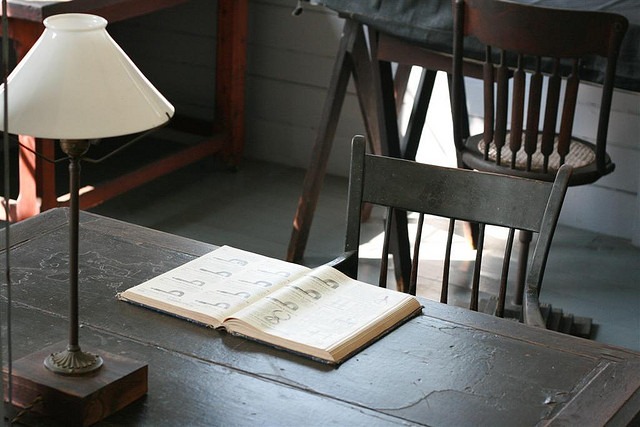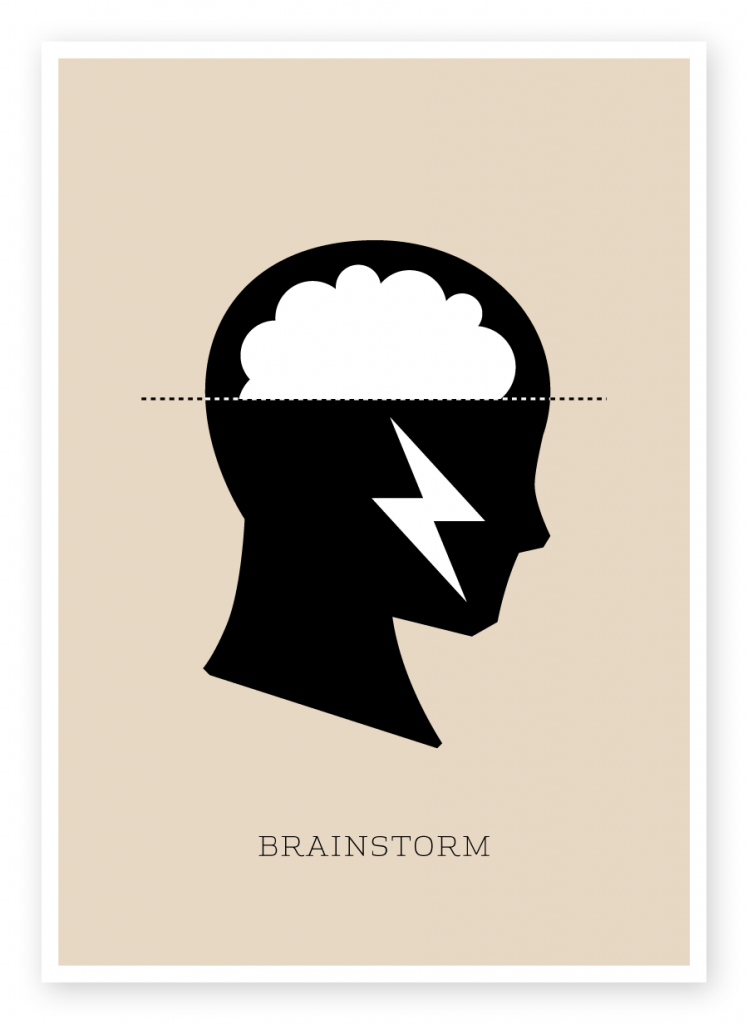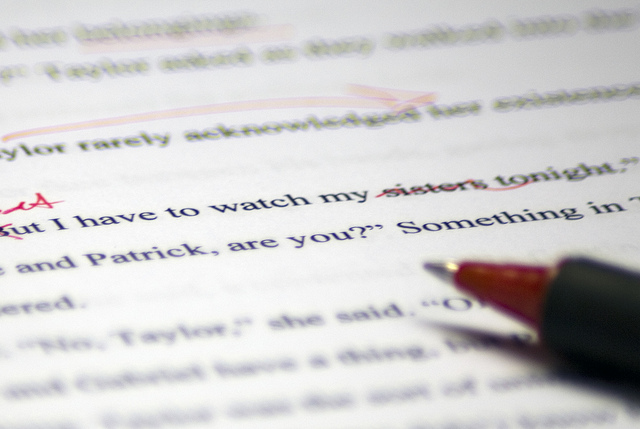After describing my future career ambitions to a family friend, she asked “well, do you think you have a book in you?” It was asked so matter-of-factly, that all I could do was return her question with a blank stare and an open mouth.
“Uhhhmmm, well ahh… I’m not sure I have a book in me, I just know that I enjoy the writing process, and hopefully one day I’ll be able to write something worth publishing.”
The older woman wasn’t satisfied; she continued to probe me with more questions I couldn’t answer. “What essays do you read?” “What’s your favourite short story?” “Have you read the works of…..?” Um, no I haven’t, now leave me alone. Feeling very unsure of myself, I went home and started pounding Google for answers. She had successfully planted the seed of doubt in my mind. If I didn’t know what I was going to write about, how could I possibly pursue a career in writing?

Image Credit: Bryan via Flickr Creative Commons.
No one said that a career in writing is easy (except for those who have never written) but it is rewarding. Particularly the first time you see your name in print. Writer’s Edit initially asked me if I wanted to write under a pen name. . . ah no! Seeing my name featured in a publication was the first step to knowing I could achieve my dream.
Sometimes, even the most established writers aren’t blessed with an epiphany that will allow them visualise every page of their next best-selling novel. We all need to undertake the writing process. This route isn’t about using the first idea that pops into your head and miraculously turning it into the next Harry Potter. It’s about coming up with hundreds of ideas, asking hundreds of questions and meticulously narrowing each answer down until you think you have the best possible idea to expand upon. And even then, once you think you’ve got it, challenging yourself to come up with three more ideas that could be even better!
So here’s my writing process. Feel free to chop, change, challenge and make it your own.
Stage 1. The Brainstorm
Coming up with a good idea is often the hardest part. I’ve spent numerous hours trying to come up with the ‘perfect’ idea for my first novel. Have I discovered it yet? At this point I don’t even have my opening sentence. But you know what I do have? Pages upon pages of brainstorming. I’m sure that within this mess lies a golden nugget, but for right now it remains hidden underneath lines, squiggles and tiny caricatures of jellybean figures beating their colourful heads against brick walls.
Brainstorming doesn’t guarantee success, but it does give you a starting point. It gives you the opportunity to be curious, creative and a little bit silly. If you’re lucky you might even find a gem. I find that the best way to brainstorm is to put pen to paper. Purchase an A3 visual art diary, a stack of rainbow coloured highlighters, and let your imagination flow. Start mapping out your ideas.

Image Credit: Andy Mangold via Flickr Creative Commons.
The best thing about using a mind map is that no thought is too wild or off-path, the most outrageous thought can trigger your most brilliant idea. Start with a very simple word, put a circle around it and branch out from there. For example the word “Mystery” – what is the first thing that comes to mind after reading the word “Mystery?” Is it Agatha Christie? Or Scooby Doo or maybe it’s something more simple like ‘dark’ or ‘mischievous’…
Stage 2. Finding Your Message
Once you have settled on an idea then you can start thinking about the message you want to communicate, if any. Will you write something inspirational? Something adventurous? Tragic? Romantic? The options are endless. Will your story contain an underlying message? Or simply be an entertaining read? The most important thing to remember when considering what to write is to target your audience. Think about who you want to write for, and what they want to indulge in. Do some research and find out what makes your potential readers tick.
It’s also a good idea to think about what you love to read and why. Generally speaking, most fiction readers will agree that they love a bit of adventure and excitement. They love playing the role of the investigator and finding out exactly what message is being portrayed. It’s not very fun if you line up the dots for the reader, making a perfect arrow for the treasure. It’s all about the discovery and making the journey worthwhile.
The most effective way of guiding your audience without giving too much away will likely be to use reoccurring motifs, as well as metaphors that will engage your readers. This may not apply to all genres of fiction, but in my mind it’s a lot more interesting to explain something figuratively and provoke thought amongst your audience than give them the answers straight away. There are a lot of interesting ways to portray your message, so it’s a great idea to practice some of the simplest writing techniques to communicate your ideas, such using similes, hyperbole, allegory etc.
Stage 3. Getting to Know Your Characters
Conjuring up the right characters to tell your story can be very time consuming and involves a lot of thought. You are essentially bringing someone to life, which means you need to consider every detail of their lives – starting from their creation to their demise. Initially you may only have one character in mind, which is a great starting point. What is this character’s back-story? Who are they? Where did they come from? What is their family like? And most importantly what sets them apart from every other character you have read?
Think about any film you have seen where a diamond heist takes place (or something similar) and the criminal creates a new identity in the hope of escaping conviction. That person knows every facet of their new identity, to the point where they almost forget who they were prior to the event that changed their life. That’s how well you should know your characters.
Once you have established who your main character is, the best idea is to move onto your plot. Additional characters may then be introduced as part of your journey, remember the more characters you add the more complex your story will be.

Image Credit: Diane Hammond via Flickr Creative Commons.
Stage 4. Establishing Your Setting
You have limitless options as to where your story could be set, it could take place in an imaginary world filled with cotton candy and mischievous leprechauns, or it could take place in your own backyard. A lot of books take place in environments that the author is familiar with. For example, children’s author Jacqueline Harvey’s Alice-Miranda series began in boarding school, this is because Jacqueline was a teacher at Sydney’s Abbotsleigh School for Girls for many years, and was inspired by her experiences there.
My advice is to pick a setting that suits you and suits your character, start somewhere familiar and then venture into the unknown. You could use your own house, suburb or city for inspiration. Your book will already involve a lot of thought and planning, taking the plot overseas (unless you are very familiar with a certain area) will only add to your work load. If you want a more exotic location be prepared to put in countless hours of research.
Stage 5. Plotting
A traditional story will generally have a set-up, conflict and resolution. It’s a good idea to plot out your story into stages before beginning to write. Too much planning can lead to no room for the characters voice to shine through, and not enough planning can result in the message being entirely lost as you stumble aimlessly across the page. After you have created your main character and decided where the story will begin, start thinking about where the story will lead.
How will your character overcome their issue? Will they have help from an additional character? Or will they need to learn their lessons alone? Fiction books often a feature ‘baddy’ to cause drama and create some action, however this is not always the case, sometimes the protagonist needs to overcome a moral dilemma and battle with their own self conscious.
You need to push the protagonist to overcome this challenging situation, turning the negative into a positive. Your character will learn valuable life lessons through their journey and will most likely come out on top. Not all stories have a happy ending, but I think it’s important to encourage your reader to take something from your novel, whether it’s a moral lesson or a question left unanswered to think about.
Stage 6. Editing.
I almost laugh out loud when I think of describing how important the editing phase is of your writing. Not because it’s funny. But because of how naïve I was prior to contributing to Writer’s Edit. I knew my writing wasn’t perfect but I definitely didn’t realise how much work actually goes into this phase of the journey. You would hope that after the brainstorming, plot analyzing, character building etc. that you’d be on the home stretch. But believe me – you’re not. I think I have written one article for Writer’s Edit that has needed very little work done to it, in comparison to numerous others that I’ve had to rewrite up to four times. And when I say rewrite, I don’t mean scratch out a sentence or two and resubmit it. I literally mean REWRITE.

Image Credit: Jenny Kaczorowski via Flickr Creative Commons.
Although the capitals may make it seem as though I resent this, I most certainly do not. I’m just trying to make it clear how important editing is. Every time I submit a piece of work that comes back with volumes of feedback (the equivalent of a page of red pen) I am thankful. I’m thankful that my editor is taking the time to help me improve my work. Without this feedback I wouldn’t grow as a writer, and in the end we all want to share our very best writing.
My biggest piece of advice would be to start sharing your work early. Don’t wait until you’ve written 800 words to discover that it needs a complete rewrite. Save yourself the pain and energy and start showing your work to your friends, family, and potential readers early. Joining a writers group is a great start. Listen to their feedback and learn from it. They aren’t being critical because they want to hurt you; they’re being honest because they want to help you achieve your goals. If you contribute to publication ask them if they can cross check your work or recommend someone who can. Honestly, if there is anything you take from this piece of writing I hope that it’s recognising the importance of getting your work critiqued.
Stage 7. Getting Published
Do everything you can to kickstart your writing career. Be active. Don’t hide your writing away and worry it’s not good enough. Start a blog, contribute to publications, write for free. Do anything and everything you can to improve your writing and make connections. Make every piece of writing count. You never know who may stumble upon your work and decide you could be the next big thing.
Believe in yourself. Don’t underestimate your capabilities. Remember that practice makes perfect, so keep writing and keep progressing. If you have a piece of work you think deserves to be published then find out who needs to see it. Who can make your dream a reality? You need to connect with the right people, so keep pushing, keep pushing, keep pushing. Eventually someone important will recognise your stellar talent and will thank their lucky stars no one scooped you up earlier.